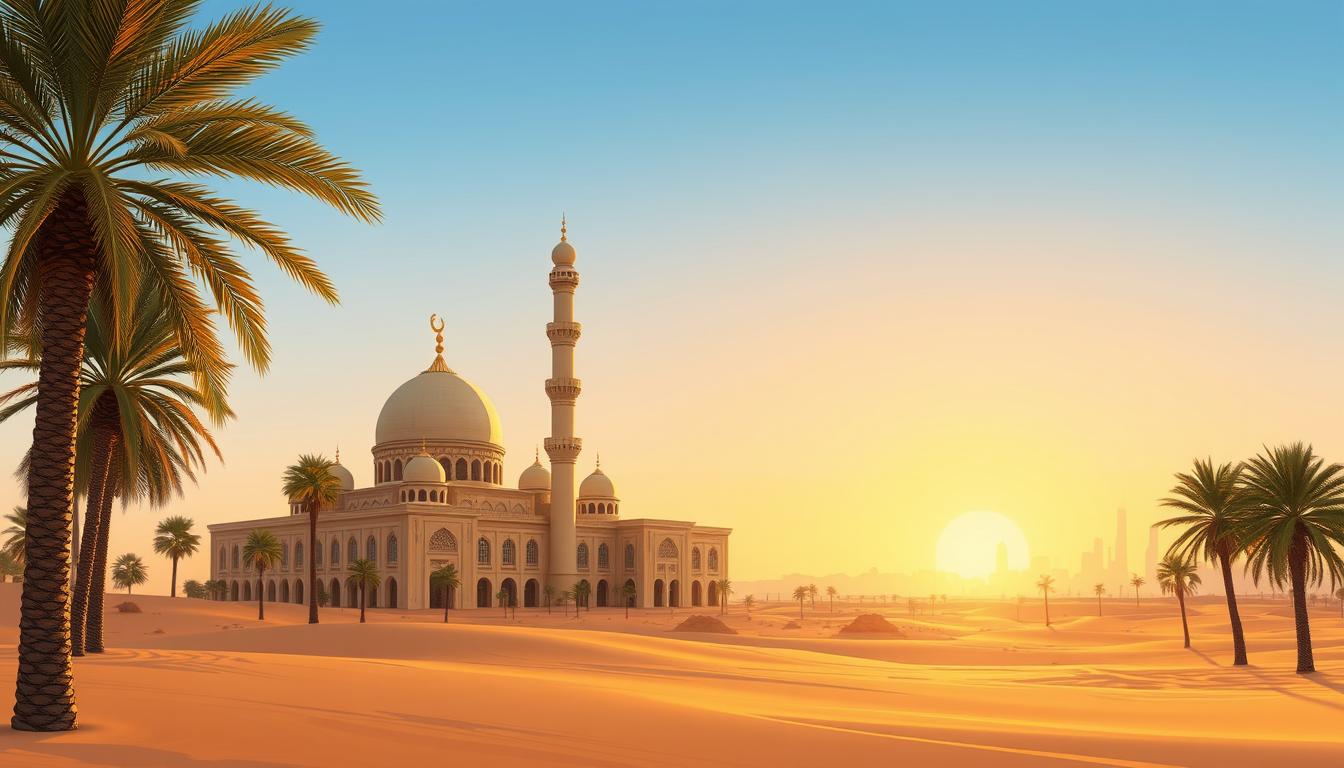Islam in the UAE
Islam is the main religion in the United Arab Emirates (UAE), with 74.5% of people following it in 2020. Most Muslims, about 63.3%, are Sunni. Shia Islam has 6.7% followers, and 4.4% belong to other Islamic groups. This shows the UAE’s rich cultural mix and the influence of different Islamic schools.
Islam has a long history in the UAE, starting after the Ridda Wars. It spread through various Islamic schools of thought. Now, Islam plays a big role in the UAE’s governance, education, and society. It’s a key part of Emirati identity and daily life.
Introduction to Islam in the United Arab Emirates
Islam is the main religion in the United Arab Emirates, with 74.5% of people following it as of 2020. Most, 63.3%, are Sunni Muslims. About 6.7% are Shia Muslims. The UAE’s constitution makes Islam the official religion, with over 90% being Sunni.
The remaining 5-10% are mostly Shia Muslims, found mainly in Dubai and Sharjah.
The UAE’s Islamic history began in the 7th century AD. During the Umayyad and Abbasid Caliphates, Islam in the UAE grew a lot.
“Islam has between 1.5 and 1.8 billion followers worldwide, making it one of the most widely practiced religions globally.”
The Muslim culture in Emirates is a big part of the country. Islamic practices are a big part of daily life. Celebrations like Ramadan and Eid are key to the UAE’s culture.
The UAE works hard to keep its Islamic heritage alive. It builds mosques, manages Islamic affairs, and follows Sharia law.
History of Islam’s Arrival in the UAE
The story of Islam in the United Arab Emirates (UAE) starts in the early 7th century AD. In 630 AD, envoys from the Islamic prophet Muhammad came to the area. This was the start of Islam in the region.
The Ridda Wars and the Triumph of Islam
After Prophet Muhammad’s death, the Ridda Wars broke out. These battles were to stop people from opposing the new Islamic rule. A key battle was at Dibba, on the UAE’s east coast.
The non-Muslims, like Laqit bin Malik Al-Azdi, were defeated. This victory made Islam the dominant faith in the Arabian Peninsula.
Spread of Islamic Schools of Jurisprudence
As Islam grew, different schools of thought in Islamic law appeared. The Bani Yas, now part of Abu Dhabi and Dubai, follow the Sunni Maliki school. Sharjah, Umm al-Quwain, Ras al-Khaimah, and Ajman stick to the Hanbali school.
Fujairah, however, follows the Shafi’i school. This diversity shows how Islam has shaped the UAE’s culture and laws.
“The arrival of envoys from the Islamic prophet Muhammad in 632 heralded the conversion of the region to Islam.”
Islamic Governance and Administration
In the United Arab Emirates (UAE), the General Authority of Islamic Affairs and Endowments (Awqaf) is key. It oversees Islamic practices across the country. This includes managing Sunni mosques, except in Dubai. There, the Dubai’s Islamic Affairs and Charitable Activities Department (IACAD) handles mosque administration.
Role of the General Authority of Islamic Affairs and Endowments
The Awqaf gives weekly guidance to Sunni imams. They provide a script and instructions for Friday sermons (khutbah). This ensures a unified message in Sunni mosques across the UAE.
The Awqaf uses a three-tier system. Junior imams follow the script closely. Midlevel imams prepare sermons based on selected topics. Senior imams have more freedom in their khutbah subjects.
Administration of Sunni and Shia Mosques
The Awqaf manages Sunni mosques, while the Jaafari Affairs Council looks after Shia mosques and endowments. This council caters to the Shia Muslim community’s unique needs within the UAE’s Islamic governance.
“The UAE’s Islamic governance model reflects the country’s commitment to maintaining a harmonious and inclusive religious landscape, catering to the diverse needs of its Muslim population.”
Islamic Education and Sharia Law
In the United Arab Emirates, Islamic education is key in schools. All students in public schools learn about Islam. This is true for both public and private schools for Muslim students.
Public schools in the UAE only teach Islamic studies. But, private schools welcome students of all faiths. Non-Muslim students don’t have to take Islamic classes, showing respect for all beliefs.
Sharia law, based on Islamic teachings, guides the UAE’s legal system. It affects family law for Muslims, like marriage and inheritance. But, laws from other countries apply to non-Muslims and non-citizens.
“Sharia is the principal source of legislation in the UAE, and it plays a crucial role in the country’s legal system, particularly in matters of personal status and family law.”
The UAE balances Islamic education with Sharia law. This shows the country’s dedication to its faith and culture. It also meets the needs of its diverse population.
Observances and Practices
The Islamic faith is deeply rooted in the culture and daily life of the United Arab Emirates (UAE). During Ramadan, the country observes special practices that show the month’s deep significance.
Ramadan Traditions and Festivities
Ramadan is the ninth month of the Islamic calendar. It’s a time for spiritual reflection, devotion, and community in the UAE. Ramadan observances Emirates are highlighted, with various Islamic practices UAE to honor the faith’s traditions.
One key observance is the ban on eating, drinking, chewing, or smoking in public from dawn to dusk. This rule applies to everyone, Muslims and non-Muslims alike. But, pregnant women, children, and those with health issues are exempt.
- Special cafes and restaurants open in the morning for those not fasting.
- Work hours are adjusted to fit prayer and fasting times.
- Employers must provide eating areas for non-fasting employees during Ramadan.
Ramadan in the UAE is also filled with festivities and community activities. Businesses often host Iftar meals to strengthen ties with clients. Charity and community service are also encouraged during this time.
“Ramadan is a time for businesses to enhance relationships by inviting clients for Iftar or arranging corporate iftars for employees.”
The Iftar cannon firing is a beloved Ramadan tradition in the UAE. It signals the end of the fast and the start of the Iftar meal. This tradition can be heard up to 8-10 km away.
Ramadan observances and practices in the UAE show the strong bond between Islam and the nation’s culture. From sacred rituals to lively celebrations, this month highlights the UAE’s dedication to its Islamic heritage.
Shia Islam in the UAE
In the United Arab Emirates (UAE), Sunni Islam is the main faith. Yet, Shia Muslims make up about 5-10% of the population. They are a key part of the UAE’s social and economic life.
The Jaafari Affairs Council
The Jaafari Affairs Council looks after the Shia Muslim community in the UAE. It handles Shia mosques, endowments, and religious issues. The council also guides Shia mosques on sermon content, making sure it fits the UAE’s norms.
Observance of Ashura
The Shia community in the UAE can celebrate Ashura, honoring Imam Hussain’s martyrdom. But, they can only do so in private gatherings. Public rallies and processions are not allowed.
“The UAE government has historically taken a pragmatic approach to managing its Shia minority, balancing religious freedoms with concerns over sectarian tensions and potential political instability.”
Even with these restrictions, the Shia community in the UAE keeps its unique religious and cultural identity. They add to the country’s rich social tapestry.
Islam in the UAE
Islam is the main religion in the United Arab Emirates, with over 74.5% of people following it as of 2020. Most, about 63.3%, are Sunni Muslims. Another 6.7% are Shia Muslims. The UAE’s constitution makes Islam the official religion, with Sunni Muslims making up over 90% of the population.
The Emirates is a place of diverse religions, with over 200 nationalities living there. Besides Muslims, there are more than 40 churches, two Hindu temples, a Sikh temple, and a Buddhist temple. This shows the UAE’s openness to different faiths.
The UAE works hard to promote Islamic moderation and dialogue between faiths. In 2013, it started the Forum for Promoting Peace in Muslim Societies (FPPMS). The Muslim Council of Elders (MCE) was formed in 2014, led by the Grand Imam of al-Azhar Ahmed al-Tayyeb.
To fight against extremist ideas, the UAE has launched several initiatives. These include the International Center of Excellence for Countering Violent Extremism, known as Hedayah, in 2012. It also has the Sawab center, started in 2015 with the United States.
“The UAE has taken an active role in promoting Islamic moderation and interfaith dialogue.”
The UAE values Islamic scholars and personalities. For example, Egypt’s former Grand Mufti Sheikh Ali Gomaa is part of Tabah’s Senior Scholars Council since 2010. The late Sheikh Said Ramadan al-Buti was named the “Islamic Personality of the Year” in 2004.
The UAE shows its commitment to Islamic values and religious tolerance. It aims to build understanding and cooperation among different faiths. The Abrahamic Family House is a symbol of this, with a mosque, church, and synagogue together.
Mosques and Islamic Architecture
The United Arab Emirates is famous for its stunning mosques and Islamic architecture. These buildings mix old traditions with new styles. They are spiritual centers and cultural symbols, showing the UAE’s strong Islamic roots.
Notable Mosques in the UAE Cities
The Sheikh Zayed Grand Mosque in Abu Dhabi is a top attraction. It was built by architect Yousef Abdelky and finished in 2007. This huge mosque can hold over 40,000 people, showing the UAE’s love for Islamic design.
The Jumeirah Mosque in Dubai is known for its beautiful neo-Fatimid style and tall minarets. The Al Noor Mosque in Sharjah is famous for its elegant calligraphy and geometric designs. These mosques are examples of Islamic architecture UAE.
“The UAE’s mosques are not just places of worship, but also showcases of the country’s rich cultural heritage and architectural prowess.”
The UAE has many mosques that show its diverse Islamic heritage. The Al Badiyah Mosque in Fujairah is the oldest known mosque in the UAE. The Al Muwaiji Mosque in Al Ain is also historic. These mosques are part of the Mosques in UAE cities that draw visitors.
Mosques like these, along with landmarks like the Burj Al Arab hotel and the Etihad Museum, show the UAE’s effort to keep its Islamic architecture UAE alive. The country blends traditional Islamic designs with modern styles. This creates a unique and inspiring architectural scene that attracts visitors worldwide.
Islamic Culture and Heritage
The United Arab Emirates (UAE) deeply values its Islamic heritage and traditions. Hospitality and generosity are key in Emirati culture. The welcoming people of the UAE love to share their way of life with visitors.
Emirati Traditions and Customs
Communal dining is common in the UAE. Shared dishes and hand-to-mouth eating show friendship and community. Muslims in the UAE follow the Halal tradition for meat prepared according to Islamic law.
The UAE’s rich culture is seen in its art, like pottery and weaving. Traditional dances, such as the ʿayyālah and ʿarḍah, are also part of its heritage. Sports like football and camel racing show its deep traditions.
The UAE works hard to keep its Islamic heritage alive. Mosques like Al Bidya Mosque in Fujairah and Sheikh Zayed Grand Mosque in Abu Dhabi are examples. These mosques blend Islamic and Arab styles, creating a unique cultural mix.
The UAE also has a thriving arts and cultural scene. Museums like the Louvre Abu Dhabi showcase the country’s cultural diversity. These museums highlight the UAE’s global importance.
The UAE’s Islamic culture and heritage are part of daily life. From traditional food to festivals, the UAE offers a unique experience for visitors.
Conclusion
Islam is the main religion in the United Arab Emirates, with over 74% of people identifying as Muslim. The country values its Islamic heritage deeply. It supports Islamic education and practices.
The government manages mosques and celebrates holidays like Ramadan. Islam shapes the UAE’s culture and society.
The UAE wants to show it’s moderate and tolerant through Islam. This is especially true since the 9/11 attacks. It aims to be seen as a leader against extremism.
But, many doubt the UAE‘s true commitment to tolerance. This is due to its human rights record.
The UAE is trying to show it’s moderate under Crown Prince Mohammed bin Zayed. It wants to keep the status quo after the Arab Spring in 2011.
The country uses Sharia law and religious talk to keep the rulers in power. It works with al-Azhar Mosque in Cairo. This shows the UAE‘s effort to be seen as a moderate Islamic leader.
Source Links
- Islam in the United Arab Emirates
- Religion in the United Arab Emirates
- Understanding Islam : The official religion of UAE – Islamic Information Center
- United Arab Emirates – Arabic, Islam, Bedouin
- History of the UAE | The Official Portal of the UAE Government
- Islam – Rise of the Religion and Empires
- History of the United Arab Emirates
- United Arab Emirates – United States Department of State
- Official religion and religious affairs’ entities
- United Arab Emirates – United States Department of State
- United Arab Emirates – United States Department of State
- Understanding Sharia: The Intersection of Islam and the Law
- Ramadan etiquette in the UAE: Cultural and workplace guide
- The Official Portal of the UAE Government
- Shia Islam in the United Arab Emirates
- UAE: Arbitrary Targeting of Pakistani Shia Residents
- UAE Culture | UAE Embassy in Washington, DC
- The UAE’s Manipulative Utilization of Religion
- From Tradition to Innovation: The Evolution of Islamic Architecture in Dubai and the UAE
- Artizan
- The UAE’s Heritage | The Official Portal of the UAE Government
- UAE Culture and Heritage: A Tapestry of Tradition and Modernity
- United Arab Emirates – Culture, Customs, Traditions
- Islam in the UAE’s Foreign Policy – Politics Today
- ‘Moderate Islam’ Made in the United Arab Emirates: Public Diplomacy and the Politics of Containment







